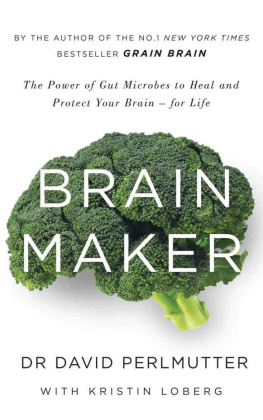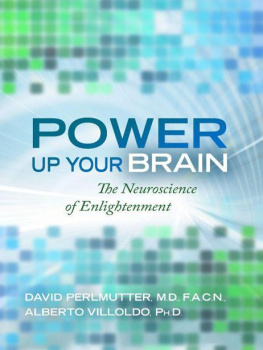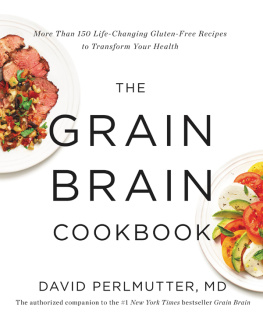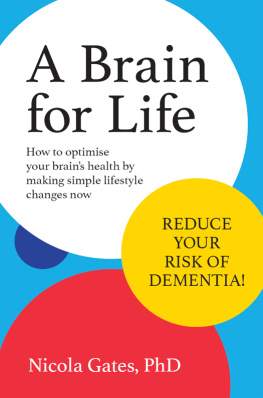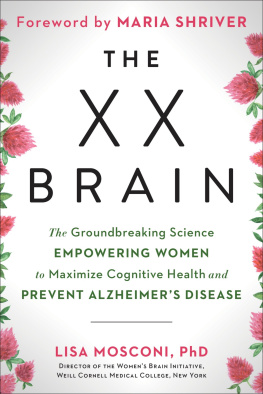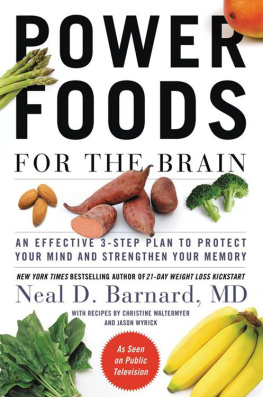ALSO BY DR DAVID PERLMUTTER

The Grain Brain Cookbook: More Than 150 Life-Changing
Gluten-Free Recipes to Transform Your Health
Grain Brain: The Surprising Truth about Wheat,
Carbs, and Sugar Your Brain's Silent Killers
Power Up Your Brain
Raise a Smarter Child by Kindergarten
The Better Brain Book

www.YellowKiteBooks.co.uk
This book is intended to supplement, not replace, the advice of a trained health professional. If you know or suspect that you have a health problem, you should consult a health professional. The author and publisher specifically disclaim any liability, loss, or risk, personal or otherwise, that is incurred as a consequence, directly or indirectly, of the use and application of any of the contents of this book.
First published in Great Britain in 2015 by Yellow Kite
An imprint of Hodder & Stoughton
An Hachette UK company
First published in the USA by Little, Brown and Company in 2015
Copyright David Perlmutter, MD 2015
The right of David Perlmutter to be identified as the Author of the Work has been asserted by him in accordance with the Copyright, Designs and Patents Act 1988.
All rights reserved.
No part of this publication may be reproduced, stored in a retrieval system, or transmitted, in any form or by any means without the prior written permission of the publisher, nor be otherwise circulated in any form of binding or cover other than that in which it is published and without a similar condition being imposed on the subsequent purchaser.
A CIP catalogue record for this title is available from the British Library
ISBN 978 1 473 61936 4
Hodder & Stoughton Ltd
Carmelite House
50 Victoria Embankment
London EC4Y 0DZ
www.hodder.co.uk
This book is dedicated to you. Just as the multitude of organisms residing within your body sustains you, so too does each and every individual influence the well-being of our planet. In a very real sense, you are an active member of the earths microbiome.

No man is an island, entire of itself
JOHN DONNE
Contents
INTRODUCTION
Bug Alert: Youve Got Company
Death begins in the colon.
LIE MECHNIKOV (18451916)
SEVERAL TIMES A WEEK THROUGHOUT my career, Ive had to tell a patient or caregiver that theres nothing left in my arsenal to treat a grave neurological disease that will inevitably shatter the patients life. Ive surrendered because the illness gained too much control and no quick fix or drug existed to even decelerate the swift march of the affliction to the end. Its a heart-wrenching place to be, one that you just dont get used to no matter how many times you go through it. What gives me hope, however, is a burgeoning area of study thats finally affording me revolutionary approaches to relieving the suffering. Brain Maker is about this dazzling new science, and how you can take advantage of it for your own health.
Take a moment to think about how much has changed in our world over the past century, thanks to medical research. No longer do we worry about dying from smallpox, dysentery, diphtheria, cholera, or scarlet fever. Weve made huge strides in lowering the death rates of many life-threatening maladies, including HIV/AIDS, some forms of cancer, and heart disease. But when you consider brain-related diseases and disorders, the picture is vastly different. Advances in preventing, treating, and curing debilitating neurological ailments across the life cycle from autism and attention deficit hyperactivity disorder (ADHD) to migraines, depression, multiple sclerosis (MS), Parkinsons, and Alzheimers are virtually nonexistent. And, sadly, we are quickly losing ground as the incidences of these conditions are increasing in our society.
Lets consider a few numbers. In the ten wealthiest Western nations, death from brain disease in general, which largely reflects death from dementia, has risen dramatically over the past twenty years. And the United States leads the way. In fact, a 2013 British report showed that since 1979, death due to brain disease increased a breathtaking 66 percent in men and 92 percent in women in America. In the words of the studys lead author, Professor Colin Prichard, These statistics are about real people and families, and we need to [recognize] that there is an epidemic that clearly is influenced by environmental and societal changes. The researchers also noted how this surge, which is affecting people at younger and younger ages, is in sharp contrast to the major reductions in risk of death from all other causes.
In 2013, the New England Journal of Medicine published a report revealing that we spend about $50,000 annually caring for each dementia patient in this country. That amounts to approximately $200 billion a year, twice what we spend on caring for heart disease patients and almost triple what we spend on treatment for cancer patients.
Mood and anxiety disorders are also on the upswing and can be equally as crippling to quality of life as other neurological conditions. About one in four adults in the U.S. more than 26 percent of the population suffers from a diagnosable mental disorder. (This is partially due to the fact that these individuals are more likely to smoke, abuse alcohol and drugs, and be overweight with obesity-related illnesses in addition to their mental challenges.)
Headaches, including migraines, are among the most common disorders of the nervous system; nearly half of the adult population wrestles with at least one headache per month. And they are more than an inconvenience; they are associated with disability, personal suffering, damaged quality of life, and financial cost.
Multiple sclerosis, a disabling autoimmune disease that disrupts the nervous systems ability to communicate, now affects an estimated two and a half million people worldwide, with close to half a million in America, and is becoming increasingly more prevalent. Mainstream medicine tells us that there is no cure in sight.
And then there is autism, which has surged seven- to eight-fold just in the past 15 years, making this truly a modern-day epidemic.
To be sure, hundreds of millions of dollars are being spent on these and other enfeebling brain-related ailments, yet we are seeing precious little progress.
Now for the good news: New, leading-edge science coming from the most well-respected institutions around the world is discovering that to an extraordinary degree, brain health and, on the flip side, brain diseases, are dictated by what goes on in the gut. Thats right: whats taking place in your intestines today is determining your risk for any number of neurological conditions. I realize this may be difficult to comprehend; if you were to ask your doctors about a known cure for autism, MS, depression, or dementia, they would throw up their arms and say none exists and may never exist.
It is here that I part company with most, but gratefully not all, of my colleagues. We as neurologists are trained to focus on what goes on in the nervous system, and specifically in the brain, in a myopic way. We automatically end up viewing other bodily systems, such as the gastrointestinal tract, as discrete entities that have no bearing whatsoever on what goes on in the brain. After all, when you have a stomachache you dont call a cardiologist or neurologist. The entire medical industry is characterized by distinct disciplines divided by body part or individual system. Most of my colleagues would say, What happens in the gut stays in the gut.

